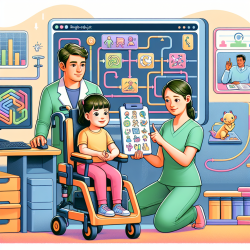Introduction
As a practitioner working with children with cerebral palsy (CP), you understand the complexities involved in addressing communication impairments. A recent study titled "Implementation of an Early Communication Intervention for Young Children with Cerebral Palsy Using Single-Subject Research Design" offers valuable insights into how early interventions can significantly enhance communication skills in young children with CP. This blog will explore the study's outcomes and provide practical tips for implementing these findings in your practice.
Understanding the Study
The research focused on an intervention protocol aimed at increasing vocal complexity in pre-linguistic children with CP. Using a repeated ABA case series design, the study evaluated the effects of a multimodal intervention on three children, tracking their progress from 15-16 months to 36 months of age. The intervention targeted advanced protophone production and speech movement patterns, individualized for each participant.
The study found positive treatment effects for all participants, with significant improvements in achieving target protophone categories and speech movement patterns. This suggests that early, targeted interventions can capitalize on periods of neuroplasticity, enhancing speech-production skills in infants with CP.
Implementing the Findings
As a practitioner, you can leverage these findings to improve your intervention strategies. Here are some practical steps to consider:
- Start Early: Initiate interventions as early as possible to take advantage of the sensitive periods of neuroplasticity. Early interventions can lead to better long-term outcomes in communication skills.
- Use a Multimodal Approach: Incorporate various methods such as tactile input, auditory stimuli, and visual cues to enhance speech motor control and communication skills.
- Customize Interventions: Tailor interventions to each child's unique needs, focusing on their specific protophone categories and speech movement patterns.
- Engage Parents: Encourage parental involvement in the intervention process. Parents can reinforce communication skills through daily routines and interactions.
- Monitor Progress: Use a single-subject research design to track each child's progress and adjust interventions as needed.
Encouraging Further Research
The study highlights the potential of early interventions in improving communication skills in children with CP. However, more research is needed to explore the long-term effects and refine intervention strategies. Practitioners are encouraged to conduct further research and share their findings to contribute to the growing body of knowledge in this field.
Conclusion
Implementing early communication interventions for children with CP can lead to significant improvements in their communication skills. By adopting a multimodal approach and engaging parents, practitioners can enhance the effectiveness of their interventions. To delve deeper into the research, consider reading the original study for a comprehensive understanding of the methodologies and outcomes.
To read the original research paper, please follow this link: Implementation of an Early Communication Intervention for Young Children with Cerebral Palsy Using Single-Subject Research Design.










